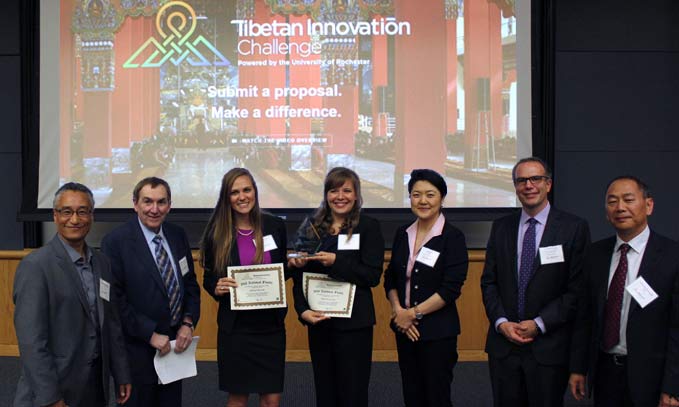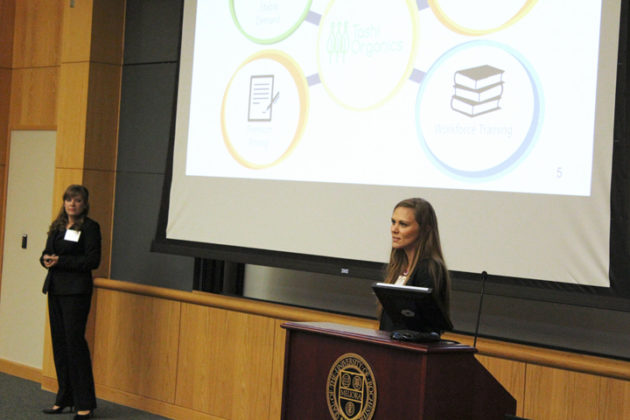
Before last week, Mikayla Hart ‘16S (MBA) had never met Kari Wozniak, a 2017 MBA candidate at the University of Illinois at Urbana-Champaign.
Now, the two are bonded: Business partners, friends—and champions.
Hart and Wozniak form the Tashi Organics team that won the second annual Tibetan Innovation Challenge on Friday, June 3, at the University’s Larry and Cindy Bloch Alumni and Advancement Center.
Four judges awarded Tashi Organics first place – and a $5,000 cash prize – after watching 15-minute presentations from each of the five finalists.
“We were happy with our presentation and thought we did very well,” says Hart, who graduated Sunday from the Simon School. “But the other four groups were also quite good.”

Second place went to FarmTibet, comprised of three students from Brandeis University; and third place was awarded to Mya Barley Power, featuring Simon School/Rochester students Katherine Cook ‘17S (MBA), Su Sean Ng ‘16S (MBA), Fahria Omar ‘17S (MBA), Brandon Smart ’19 (Computer Science/Economics), and Sarah Spoto ‘17S (MBA).
The intercollegiate business plan was created at the University in 2015 as a social entrepreneurship aimed at improving the lives of 125,000 Tibetan refugees. Texas Tech won the inaugural competition in New York City last July.
Tashi Organics is a social enterprise that will use training programs and value-added food processing to develop sustainable sources of income for Tibetan organic farmers. The plan is to lower refugees’ costs related to post-harvest food loss and empower them to create products sold through India.
Hart, who is from Kauai, Hawaii, first became acquainted with Wozniak through a social entrepreneurship program called the Hult Prize several months ago. During her research, she contacted Wozniak because of her expertise in post-harvest food loss.
Hart’s team didn’t advance in the Hult Prize, but she kept in contact with Wozniak through texting, phone calls, and Google Docs, and the two decided to partner for the Tibetan Innovation Challenge.
“We had to create a video for the first round of submissions, so we each recorded ourselves doing portions and then Kari put it all together,” Hart says. “By the time we actually met, I felt like I knew her so well.”
That first meeting came Thursday night on the eve of the Challenge competition. They practiced their presentation Thursday and Friday whenever time allowed, since Hart also was preparing for her graduation. They were the fifth and final group to present their plan on Friday.
“I typically don’t like going last,” Hart says. “I get nervous. But this time, I think it worked well for us.”
The judges were Randall Kempner, executive director of the Aspen Network of Development Entrepreneurs; Lobsang Nyandak, executive director of the Tibet Fund and Trustee to the Dalai Lama Trust; Song Pak, SVP of Operations and Acting General Counsel, Revolution, LLC and General Counsel and Chief Compliance Officer, Revolution Growth; and Tashi Nangsetsang, Tibetan Community Leader in Toronto and project manager, A&L Contractors.
They praised Tashi Organics’ “realistic” plan and said they believe it can make a positive impact on Tibetan refugees.
The first item on Tashi Organics’ agenda is an organic juice line that will offer consumers a healthy beverage that creates positive social and environmental impacts.
“Our first step is to build strong relationships in the region, work with the Tibetan administration and hire a few refugees to help run things from there,” Hart says.
They hope to raise funds and build a facility in Mundgod in the Indian state of Karnataka by mango season next spring.
Hart has plenty to keep her busy in the meantime. She recently accepted a job as a strategy consultant for Accenture, a business management consultant firm, in New York City.
Sponsors of the Tibetan Innovation Challenge include: The University of Rochester Ain Center for Entrepreneurship, the Art of Peace Foundation, the Tibet Fund, and Tibetan Entrepreneurship Development.




